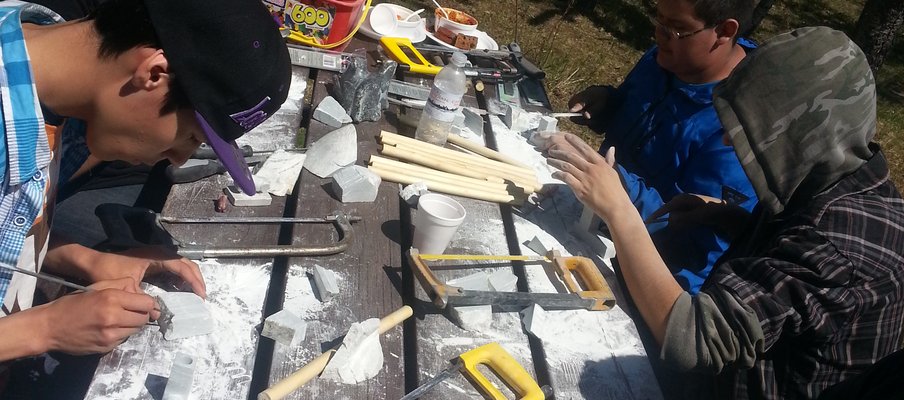
Oskayak Culture Camp connects youth to tradition
In this issue
 Engage - Volume 4, Issue 1, Fall 2013
Engage - Volume 4, Issue 1, Fall 2013
Related Programs
In May 2013, students from Oskayak High school in Saskatoon travelled north to the shores of Waterhen First Nation by the Meadow Lake Provincial Park. Oskayak, which means “young people” in Nehiyawewin (Cree language), is a unique high school where ‘Culture and Academic excellence meet’. Recognizing that many urban youth have been disconnected from their communities and cultures of origin, the school aims to complement the required academic undertakings of a high school education with opportunities for awareness building experiences in First Nation cultures.
With the assistance of an Aboriginal Arts and Culture Leadership grant, Oskayak school coordinators, elders at Oskayak and the Waterhen First Nation, selected Waterhen Lake to host a four-day culture camp.
The goal of the culture camp was to mentor and support Indigenous youth in acquiring cultural competencies to strengthen an individual and collective sense of identity.
Elders and cultural resource peoples from multiple communities, including Waterhen First Nation, Kawacatoose, Sucker River and Muskoday, collaborated to provide a well-rounded experience for the youth to develop as emerging leaders.
“We want to help the youth retain Cree culture in their contemporary lives,” explains Sid Fiddler, one of the camp coordinators. “We know for many of them that the language is lost, but they can still carry on traditional Cree values that will help them in their everyday lives.”
Youth were provided opportunities to engage with elders, ask questions and learn. Workshops in traditional craft, snaring and cooking also provided for some hands-on learning. Late into the evening, round dance songs could be heard across the lake as the youth sang and shared with one another. For some, this was another milestone in their own journeys of rediscovering their cultural identities. For others, it was an entirely new experience.
Rachel Fiddler, another of the camp coordinators, describes how non-native youth have begun to register as students at Oskayak. “First Nations culture resonates with them. It’s really good to see non-native youth connect to our culture and way of life.” With multiple elders and cultural resource people on hand, the camp provided a lot of experiences and teachings that will be useful throughout participants’ lives.
“We had a phenomenal chance to connect with our traditions, our mother earth and our ancestors,” describes Rachel Fiddler.
“Students came back from camp completely transformed, with awakened spirits and a yearning to learn more. The culture camp was a highly effective means of teaching youth about culture, holistic health and taking care of their spirit within,” she adds.

